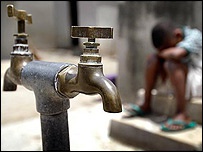
Accra, Aug. 26, GNA - The Ghana Water Company Limited (GWCL) on Tuesday explained that the 10-day water interruption in some parts of Accra has been necessitated by the need to work on a project to boost water supply in the capital.
Mr Kwaku Bowte, Acting Managing Director of GWCL, said at the end of the project water supply in the eastern Accra, including Adenta, Madina, Pantang, University of Ghana, GIMPA and surrounding areas would experience an enhanced water supply while it would be possible to link pipes from the Wieja Dam to the Accra Booster Station at Okponglo. Mr Botwe gave the explanation prior to a media tour of the Accra Booster Station at Okponglo to enable journalists know what is going on and what the project is about.
The project dubbed: "East-West Interconnection Project," would make it possible to link water supplied from the Weija Dam to the Accra Booster Station so that excess water from Weija could be channelled to the eastern parts which do not have constant water supply. Water from the Kpong Dam and Weija would connect in a way that would make Wieja supplement supplies from Kpong. As part of the project GWCL would replace the old pumps at the booster station.
The old pumps, which currently have the capacity to pump about 130,000 gallons of water per hour, would be replaced with new ones, which have higher capacity to pump about 260,000 gallons of water per hour.
Mr Botwe said that an on-going expansion project at the Weija Dam would enable the dam to supply extra 15 million gallons of water a day. He said at the end of the 10-day work those in the eastern part of Accra would not have constant supply but would have more than they used to have.
For instance if Adenta is having one-day flow of water in a week, it would improve to about two days flow in a week.
Mr Theo Smit, General Manager in charge of distribution at AVRL, operators for GWCL, said to minimize the effect of the water shortage on the affected communities, 40 water tankers would supply water free of charge to those in the affected communities.
Affected areas include University of Ghana, GIMPA, Pantang Hospital, Achimota, Paraku, Dome Pillar 2, Haasto, Kwabenya, Madina and surrounding areas.